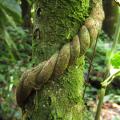
Boundary condition

Posts: 8617 Joined: 30-Aug-2008 Last visit: 24-Dec-2025 Location: square root of minus one
|
That last one's Phragmites australis. Not too promising, although it would be interesting if you could make an extract of the flowers for prospective alkaloid testing. That may prove more fruitful than the rhizomes, which, given the situation pictured, are hardly accessible. They are very difficult to dig up, thus it's much easier to harvest them from deep water using a boat. The reference for DMT in P. australis roots is: "Alkaloids from the rhizomes of Phragmites australis (Cav.) Trin. ex Steud." Scientia Pharmaceutica, Wassel, G.M. et al, 1985, 53 (3): 169-170 “There is a way of manipulating matter and energy so as to produce what modern scientists call 'a field of force'. The field acts on the observer and puts him in a privileged position vis-à-vis the universe. From this position he has access to the realities which are ordinarily hidden from us by time and space, matter and energy. This is what we call the Great Work." ― Jacques Bergier, quoting Fulcanelli
|
|
|
|
|
DMT-Nexus member
Posts: 7 Joined: 18-Nov-2017 Last visit: 26-Sep-2019
|
Hello,so I walking in the park and saw this familliar looking grass was growing everywhere along the creek:  I picked up some leaves and saw that they were pretty long,in wikipedia it says that the leaves should be only 30cm   I know it's not the best time to harvest Phalaris grass,when I found it I'll use use it to practice the extraction since I have a very limited amount of MHRB so I don't want to mess up the extraction. Also,would a deffating step be needed if I pull it with toluene and then salt it out with vinegar,I'm guessing all the fats would still be in the toluene?
|
|
|

Dreamoar

Posts: 4711 Joined: 10-Sep-2009 Last visit: 16-Jan-2026 Location: Rocky mountain high
|
oceanman wrote:Hello,so I walking in the park and saw this familliar looking grass was growing everywhere along the creek Appears to be Phragmites australis. You are going to google that and get all excited because it will tell you it contains DMT in the roots. Hold on just a moment, you need to look deeper. This grass also contains some very unpleasant compounds such as bufotenidine in it's roots that could be damaging to your health. This is not really a viable source of DMT, wild grasses have too widely variable of an alkaloid profile to be suitable for DMT extraction. If DMT is your goal, either get a strain of phalaris with a known alkaloid profile and start growing that, or look to the trees.
|
|
|
DMT-Nexus member
Posts: 7 Joined: 18-Nov-2017 Last visit: 26-Sep-2019
|
dreamer042 wrote:oceanman wrote:Hello,so I walking in the park and saw this familliar looking grass was growing everywhere along the creek Appears to be Phragmites australis. You are going to google that and get all excited because it will tell you it contains DMT in the roots. Hold on just a moment, you need to look deeper. This grass also contains some very unpleasant compounds such as bufotenidine in it's roots that could be damaging to your health. This is not really a viable source of DMT, wild grasses have too widely variable of an alkaloid profile to be suitable for DMT extraction. If DMT is your goal, either get a strain of phalaris with a known alkaloid profile and start growing that, or look to the trees. Thanks for the info,what was the distinguishing feature from Phalaris grass because they look very similar to me,except that P.australis can be a lot bigger and the images on internet vary so much on both of these species. I would gladly work with the trees however there doesn't seem to be growing in my country(Lithuania) and the customs here are bad.For example,there was one case where some guy ordered LSA seeds and just because of these seeds customs got a search warrant and during the search they found that he also had also some yopo seeds in the possesion and was growing some cannabis plants,so yeah precursors are treated just as bad if not worse,so I have to work with what I have
|
|
|

Dreamoar

Posts: 4711 Joined: 10-Sep-2009 Last visit: 16-Jan-2026 Location: Rocky mountain high
|
Lithuania is a beautiful country! It's very rich in fungi as well.  As for telling the difference between phragmites and phalaris, the flowers are completely different. Phalaris:  Phragmites:  Notice the Phragmites flowers are much more feathery and have a reddish/brown hue to them. Phalaris flowers are much more yellow/brown and compact, opening up slowly over the course of the growing season. As you mentioned Phragmites is generally much taller than Phalaris as well. Note that Arundo donax also has a similar feathery flower head like Phragmites but is usually much much taller easily doubling or tripling the height of an average person.
|
|
|

Boundary condition

Posts: 8617 Joined: 30-Aug-2008 Last visit: 24-Dec-2025 Location: square root of minus one
|
I always check the ligules. Where the leaf joins the stem, a membrane extends upwards for about 3-4 mm with Phalaris arund., whereas the ligule on Phragmites consists of feathery hairs. Phalaris:  Phragmites:  Beware! Other grasses can also have membranous ligules so check the habitat and other characteristics before filling up bags of grass...  “There is a way of manipulating matter and energy so as to produce what modern scientists call 'a field of force'. The field acts on the observer and puts him in a privileged position vis-à-vis the universe. From this position he has access to the realities which are ordinarily hidden from us by time and space, matter and energy. This is what we call the Great Work." ― Jacques Bergier, quoting Fulcanelli
|
|
|
DMT-Nexus member
Posts: 7 Joined: 18-Nov-2017 Last visit: 26-Sep-2019
|
Thanks for info guys,I see the differences now.
As for the fungi I was hunting them all October in Grasslands and pastures and indeed there are a lot of Panaeolus(incative ones),Psathyrella and Mycena species however I haven't managed to find any Liberty caps and the season seems to over now so I guess I'll try harder to locate them next season
|
|
|

DMT-Nexus member
Posts: 3 Joined: 06-Sep-2015 Last visit: 24-Jun-2018 Location: -
|
Jagube: The second species in your September post looks to me like Arrhenatherum elatius (false oat-grass). Its spikelets have a single awn coming out of them (and look oat-like). The way the inflorescence branches also seems like that species. 
|
|
|
DMT-Nexus member
Posts: 2 Joined: 14-Jan-2018 Last visit: 24-Oct-2018
|
The attached pdf is very helpful in identifying Phalaris Arundinacea. It is in German. The distinguishing feature of different grasses are described. Phalaris Arundinacea = Rohrglanzgras
|
|
|

DMT-Nexus member
Posts: 366 Joined: 12-Mar-2016 Last visit: 27-Jul-2021
|
|
|
|

DMT-Nexus member
Posts: 366 Joined: 12-Mar-2016 Last visit: 27-Jul-2021
|
|
|
|

DMT-Nexus member
Posts: 366 Joined: 12-Mar-2016 Last visit: 27-Jul-2021
|
What do you think? grollum attached the following image(s):  ph_1.jpg (311kb) downloaded 200 time(s). ph_2.jpg (508kb) downloaded 197 time(s). ph_3.jpg (400kb) downloaded 198 time(s).
|
|
|

DMT-Nexus member
Posts: 366 Joined: 12-Mar-2016 Last visit: 27-Jul-2021
|
No one? any idea? For me it looks like arundinacea The plants are quite big. From 1m to 2m. Its growing on the side of a big river in an area which gets flooded from time to time.
|
|
|

DMT-Nexus member
Posts: 3 Joined: 06-Sep-2015 Last visit: 24-Jun-2018 Location: -
|
That does look like P. arundinacea to me. It's the right kind of size and proportions; the habitat fits; the ligule is right, and the inflorescence looks right (note that it's got a kind of '3D' style in the way it branches out, Dactylis glomerata looks super similar but has a flattened plane to its inflorescence). Another thing you could do to check the ID is to open up one of the leaf sheaths and hold it up to the light - if it's P. arundinacea there should be little horizontal lines as well as the usual long dark veins, making it look slightly like a brick wall. But even without that I think you can be pretty confident in the identification.
|
|
|

Boundary condition

Posts: 8617 Joined: 30-Aug-2008 Last visit: 24-Dec-2025 Location: square root of minus one
|
The clincher would be if it's growing in at least a reasonably damp area if not a river bank or water meadow. “There is a way of manipulating matter and energy so as to produce what modern scientists call 'a field of force'. The field acts on the observer and puts him in a privileged position vis-à-vis the universe. From this position he has access to the realities which are ordinarily hidden from us by time and space, matter and energy. This is what we call the Great Work." ― Jacques Bergier, quoting Fulcanelli
|
|
|

DMT-Nexus member
Posts: 1111 Joined: 18-Feb-2017 Last visit: 12-Jul-2024
|
How about this one? Jagube attached the following image(s):  IMG_20180520_124103.jpg (965kb) downloaded 134 time(s). IMG_20180520_124130.jpg (357kb) downloaded 137 time(s).
|
|
|

DMT-Nexus member
Posts: 366 Joined: 12-Mar-2016 Last visit: 27-Jul-2021
|
@Jagube, for me this looks like Dactylis glomerata. One thing which Dactylis has and Phalaris not is this zigzag shape of the flower stem. And like betelgeuse said Dactylis has a more 2D flower whereas Phalaris a. is 3d.
@betelgeuse this 3d style thingy is a mega hint. The only thing which is confusing. The plants are much bigger then a Phalaris "Big Medicine" clone I saw some time ago.
What size are those little horizontal lines? Very small? Almost not visible?
|
|
|
DMT-Nexus member
Posts: 7 Joined: 18-Nov-2017 Last visit: 26-Sep-2019
|
|
|
|

Boundary condition

Posts: 8617 Joined: 30-Aug-2008 Last visit: 24-Dec-2025 Location: square root of minus one
|
Here's a couple of pictures, first of P. arundinacea cv. 'Picta', second of P. aquatica 'AQ1'. downwardsfromzero attached the following image(s):  IMG_8862.JPG (3,113kb) downloaded 108 time(s). IMG_8863.JPG (3,038kb) downloaded 110 time(s). “There is a way of manipulating matter and energy so as to produce what modern scientists call 'a field of force'. The field acts on the observer and puts him in a privileged position vis-à-vis the universe. From this position he has access to the realities which are ordinarily hidden from us by time and space, matter and energy. This is what we call the Great Work." ― Jacques Bergier, quoting Fulcanelli
|
|
|

DMT-Nexus member
Posts: 75 Joined: 02-Jun-2018 Last visit: 03-Sep-2018
|
Edit: unable to upload photos.
|